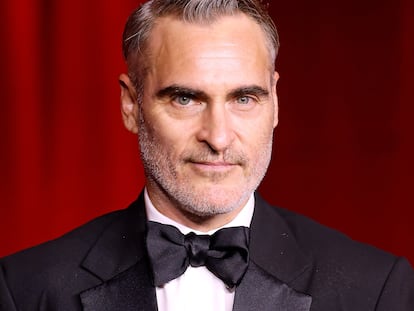 Joaquin Phoenix at the Academy Museum Gala in Los Angeles in October 2024.TAYLOR HILL (FILMMAGIC/GETTY)
Joaquin Phoenix at the Academy Museum Gala in Los Angeles in October 2024.TAYLOR HILL (FILMMAGIC/GETTY)From a cult to Hollywood royalty: Joaquin Phoenix, the star who has overcome it all
One of the most brilliant and unconventional actors of his generation turns 50 at an interesting juncture in his career. Although his last two major projects have flopped, he has a knack for coming back when least expected
Joaquin Phoenix’s life has always been unconventional. Born in Puerto Rico, the 50-year-old actor was raised by parents, Arlyn and John Lee Bottom, who shared a strong countercultural spirit. The couple met while hitchhiking, married soon after, and, disillusioned with American politics, left California to explore South America. There, they raised their five children — River, Rain, Joaquin, Liberty, and Summer — leading an itinerant lifestyle with little concern for material possessions. Their quest for purpose led them to join The Children of God, a religious group in which they spent years preaching while living in extreme poverty. They eventually broke ties with the group after receiving a letter from its leader, David Berg, urging members to engage in sexual relations with as many people as possible to recruit followers.
It was the first time the Bottoms became aware of what was an open secret in the rest of the world: The Children of God were a dangerous sect wanted by Interpol, and led by a man — David Berg — who was accused of murder. “I think my parents thought they’d found a community that shared their ideals. Cults rarely advertise themselves as such. It’s usually someone saying, ‘We’re like-minded people. This is a community,’ but I think the moment my parents realized there was something more to it, they got out,” Phoenix told Playboy magazine in 2014.
After that letter, the Bottoms changed their surname to Phoenix, in honor of the mythological bird, and returned to the United States. Phoenix has never judged them, and does not believe they were “negligent.” “They were idealists, and believed that they were with a group who shared their beliefs, and their values. I think they probably were looking for safety, and family. Leaving a country that had assassinated a president and any number of civil rights leaders within a few fucking years, which is so hard for me to fathom, right?” he told Vanity Fair in 2019.
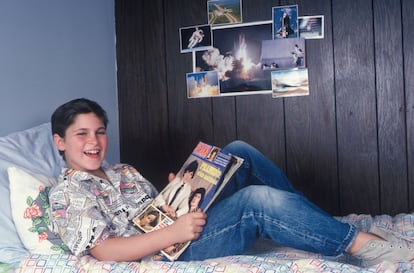
During their time in South America, the children had made a living singing and dancing, and that led their mother to contact an agent at NBC, who saw their appeal. Joaquin — who then went by the name “Leaf” to match his siblings’ earthy names — joined his brother River for his screen debut in the TV show Seven Brides for Seven Brothers. Joaquin described this first experience on camera as “Instantaneous joy.” “For some kids, it’s the first time they crack a ball or score a goal. For me, it was this,” he told The Guardian. “I knew that I loved it — the physical sensation; how powerful it was. That’s the feeling I’ve been chasing ever since.
After that debut, Joaquin had minor roles in shows like Murder, She Wrote and Hill Street Blues, as well as a few youth-oriented films that gained limited attention. His first substantial role came with Ron Howard’s Parenthood (1989), in which his character would later be portrayed by Leonardo DiCaprio in the TV adaptation. However, as River’s fame surged, Joaquin was sometimes dismissed as “the second most famous Phoenix,” leaving him feeling that his own career was stalling. Frustrated, he took a break and spent time in Mexico with his father. Upon returning to Los Angeles, River encouraged him to get back into acting, telling him, in what would become a prophetic statement, “You’re going to be a more successful actor than I am.”
By the early 1990s, River Phoenix was already a star, recognized for playing the young Indiana Jones in Indiana Jones and the Last Crusade (1989) and for his haunting performance as a narcoleptic male hustler in Gus Van Sant’s My Own Private Idaho(1991), for which he won the Volpi Cup in Venice. In 1993, just days after Joaquin’s 19th birthday, River died of a drug overdose outside The Viper Room in Los Angeles. He was only 23 years old, but he had already become an icon. The family moved to Costa Rica to grieve away from the intense media scrutiny that followed River’s death. The first time Joaquin returned to the United States was to take part in the casting of To Die For (1995). The movie’s director, Gus Van Sant, a close friend of River’s, reportedly burst into tears when he saw him.
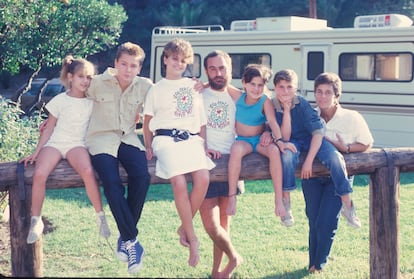
His role alongside Nicole Kidman in To Die For, the film adaptation of the Pamela Smart crime drama, drew the attention of director James Gray, who would become a pivotal figure in Phoenix’s career. Gray even wrote a piece in The New York Times declaring him one of the finest actors of the 21st century, arguing he “is unbelievably good at conveying his internal life without dialogue.”
Phoenix’s portrayal of the sinister Emperor Commodus in Gladiator (2000) ultimately won over even his skeptics. The film’s immense success — grossing over $400 million — made him a favorite for casting directors seeking someone with a darkly magnetic edge. Among his admirers was none other than Johnny Cash, whom Phoenix would later portray in the biopic Walk the Line (2005), which focuses on the singer’s turbulent romance with June Carter.
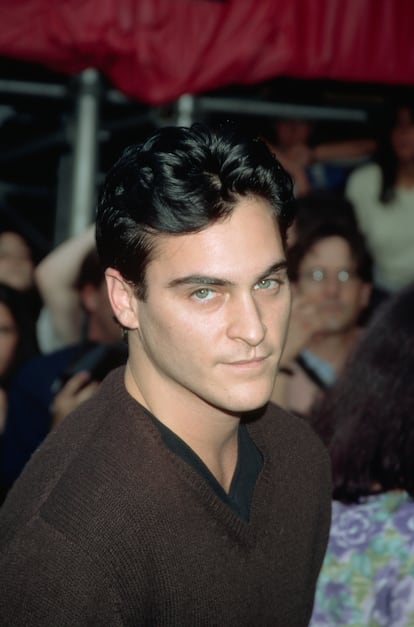
At the time, Phoenix was also in a turbulent period of his life: “I wasn’t engaging with the world or myself in the way I wanted to. I was being an idiot, running around, drinking, trying to screw people, going to stupid clubs,” he confessed.
In 2005, Phoenix entered rehab, and months later, he was involved in a bizarre car accident in Los Angeles, from which he was rescued by German director Werner Herzog. Strange stories began to follow him. Rumors circulated that he was considering quitting acting, and few were surprised. Then came his most eccentric period: he announced a plan to become a hip-hop artist under the guidance of the unpredictable Diddy. The industry was left in disbelief when he appeared on The David Letterman Show looking disheveled, sporting a long, unruly beard, and seeming disoriented or even high.
Speculation exploded — had he lost his grip on reality, or was this his greatest performance yet? His friend and then-brother-in-law Casey Affleck, who was constantly filming him, provided a clue. It was all part of a project, but what kind? I’m Still Here (2010) documented Phoenix as he spiraled into apparent chaos — snorting drugs, acting out in violent bursts, and hiring prostitutes.
What could have driven a two-time Oscar nominated actor to risk his career so spectacularly? According to Phoenix, I’m Still Here was intended to be “a film that explored celebrity, which explored the relationship between the media and the consumers, and the celebrities themselves.” This bizarre endeavor, which he now calls “the best thing I’ve done in terms of helping me grow as an actor and gain a deeper appreciation for acting,” not only did not destroy his career — it led him to two of his most lauded roles: The Master (2012) and Her (2013). Phoenix believes that, after seeing the documentary, director Paul Thomas Anderson understood he was willing to go to any lengths for his craft. And he was. The Master brought him his first Oscar nomination for Best Actor.
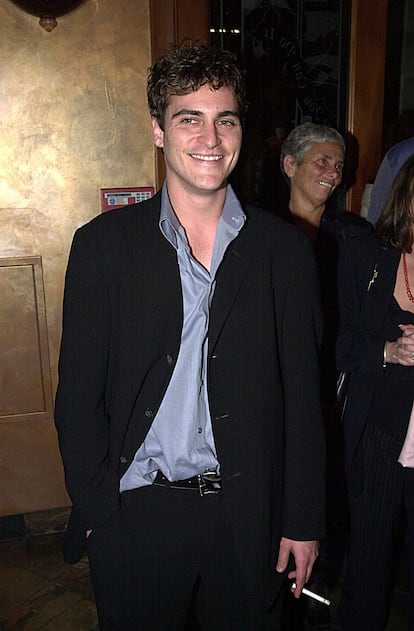
After his widely parodied appearance on Letterman, Phoenix returned to the show to apologize, and this vulnerable moment caught the eye of Spike Jonze, who was then casting the timid Theodore Twombly for Her.
By now considered one of the greatest actors of his generation, Phoenix continued to prove he could tackle any role. He sought out intensity, playing a range of unforgettable characters: a Woody Allen-esque philosopher in the uneven Irrational Man (2015), a stoner detective born of Thomas Pynchon’s imagination in Inherent Vice (2014), a tormented cop in You Were Never Really Here (2017), and a drunken cowboy in the underrated The Sisters Brothers (2018).
Just when it seemed his career couldn’t reach new heights, Phoenix took on the most significant role of his life: Arthur Fleck in Joker (2019), a box-office sensation that earned him his first Oscar. To portray the unhinged Fleck, Phoenix needed no elaborate makeup — only his intense gaze and the haunting smile that crossed his face, punctuated by a scar. Unlike the drama surrounding many events in his life, the scar does not have an elaborate backstory: it is just a birth defect.
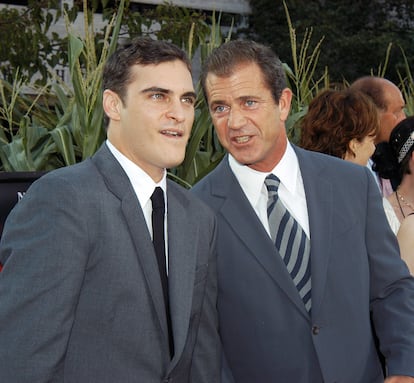
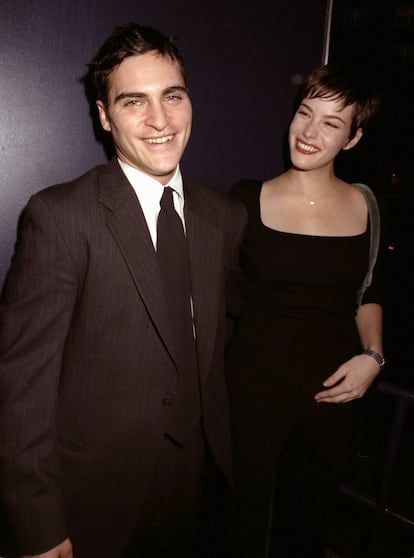
Winning the Oscar did little to tame Phoenix’s bold choices. He continued to embrace challenging roles, including his surreal turn in Beau Is Afraid (2023) by Ari Aster, with whom he teamed up again for Eddington (2025). But there were setbacks, too. His performance in Napoleon (2023) by Ridley Scott fell flat with critics, and the highly anticipated Joker sequel — a musical subtly marketed to avoid alienating Fleck’s incel fan base — became one of 2024′s most talked-about flops.
Phoenix has remained silent about these recent projects, which is unsurprising from an actor who rarely gives interviews. The media frenzy surrounding his brother River’s death left a lasting scar, one that keeps him away from social media and Hollywood gatherings. Last week, however, he surprised the public with rare photos at a charity gala with his wife, Rooney Mara, who he met on the shoot of Her.
“She’s the only girl I ever looked up on the internet,” he told Variety in 2019. “We were just friends, email friends. I’d never done that. Never looked up a girl online.”
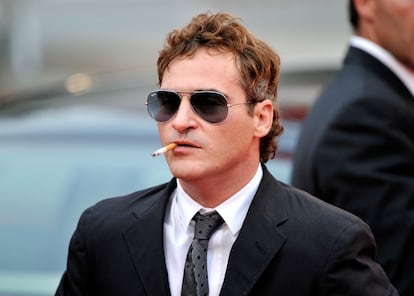
Though they seldom make public appearances together, Joaquin Phoenix and Rooney Mara share a commitment to animal rights that has gone viral in memorable moments, such as their celebration after Phoenix’s Oscar win for Joker — a night marked by vegan burgers. Both are vocal advocates for ethical treatment of animals, with Phoenix particularly driven by this cause.
He narrated the impactful documentary Earthlings (2005), a hard-hitting exposé on speciesism, and consistently highlights animal rights. “I don’t want to cause pain to another living, empathetic creature,” he told Brut. “I don’t want to take its babies away from it, I don’t want to force it to be indoors, and fattened up just to be slaughtered. It is absurd and barbaric, and I don’t understand how you could witness that and not be affected by Phoenix is aware that his outspoken views can be polarizing, but he is unfazed. “I’ve always had a hard time,” he told Vanity Fair in 2019. “And, I think only recently, as you get older, or whatever, you’re okay. You go, ‘Maybe it is going to be a bad experience.’ [...] Because I know that I have meaning in other parts of my life. And that’s really what sustains me. I enjoy it. I love my life. I fucking love my life.”

No comments:
Post a Comment